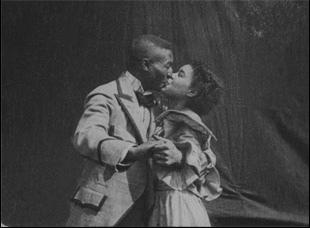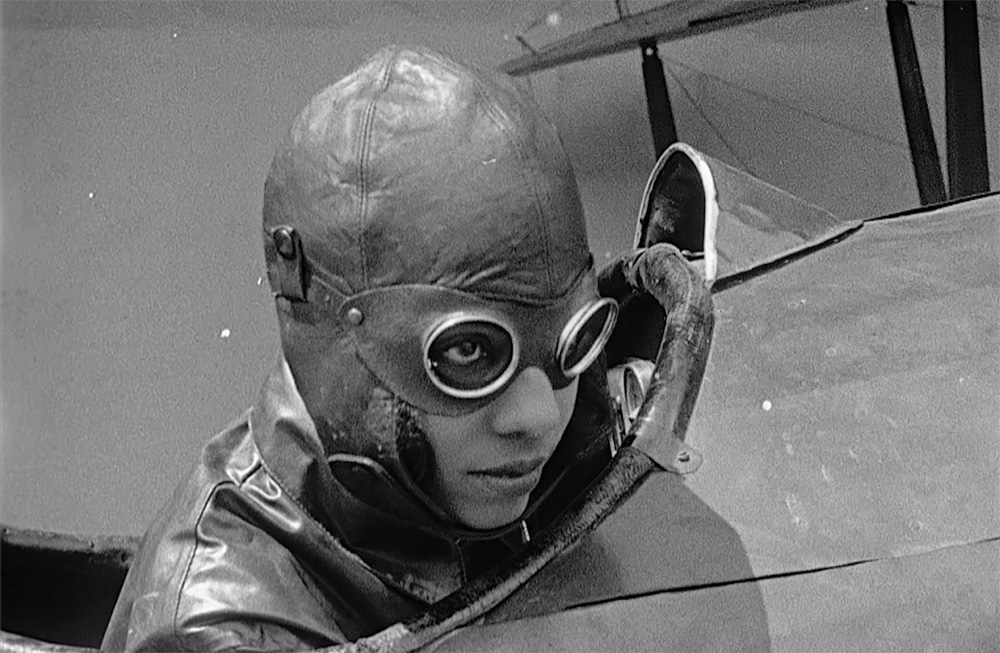At the time of its release in 1926, “The Flying Ace” was billed as “The Greatest Airplane Mystery Thriller Ever Produced,” following a World War I vet (Laurence Criner) back home where he plans to settle back into detective work and falls for a fellow aviator (Kathryn Boyd), only to stumble into a scheme involving nefarious happenings around the local railroad that sees the would-be couple take to the skies to pursue justice, even if they’re prevented from getting off the ground in other ways. The film was inspired in part by Bessie Coleman, a groundbreaking pilot who was the first African American woman to hold a license to fly, and she would’ve had a role in the picture if she hadn’t tragically died, due to a faulty plane shortly before filming.
Nonetheless, filmmaker Richard E. Norman, who drew on a fortune in the soda pop business to make movies that he hoped would allow the Black community to see themselves on screen in aspirational roles, was making history with the action-packed drama that was said to inspire some future Tuskegee Airmen to see in a future in aviation, and generations later, if anyone could unpack its grace notes for a contemporary audience, it was going to be the composer Kathryn Bostic.
“There are so many layers of narrative that can be explored musically — intrigue, drama, romance, action, comedy and more — so I just had this great sense of sonic conversation about all of it,” said Bostic, via e-mail shortly before unveiling an original score for a special screening of “The Flying Ace” at the Academy Museum this Saturday, July 15th. “The score is an observant character in this.”
And not a passive observer, but an active one when Bostic has a way of changing the course of history, becoming the first female African American composer invited into the Academy of Motion Pictures Arts and Sciences and serving a quite literally instrumental role in the early features from Ava Duvernay (“I Will Follow”), Justin Simien (“Dear White People”) and Chinonye Chukwu (“Clemency”). Her “reimagining” of the soundtrack for “The Flying Ace” actually will bring a spotlight to two very worthwhile attractions currently at the Los Angeles-based Academy Museum, announcing its Ted Mann Theater as a weekend destination in July and August for screenings of rare silent films with live musical accompaniment with the series Silent Sundays and encouraging audiences to take in the ongoing exhibit “Regeneration: Black Cinema 1898-1971” that gives a much-deserved spotlight to African American filmmakers working inside and outside the Hollywood system to bring their experience to the big screen. The latter actually inspired Bostic to approach the Academy with the idea of a “remixed regeneration” employing her gift of music.
“I visited the ‘Regeneration: Black Cinema 1898–1971’ exhibition and was struck by the richness and historic value of this incredible treasure trove of African American films and memorabilia,” says Bostic. “When I saw some of the silent film clips, my imagination was in overdrive about the possibilities of contributing original music narrative to accompany some of these films. I spoke of my interest to create a unique score and Jacqueline Stewart, Academy Museum President and Director, liked the idea.”
Bostic might’ve pitched it, but there couldn’t be a composer more up to the task, often summoning the soul of archival footage in her frequent work in documentaries such as Sam Pollard’s “Lowndes County and the Road to Black Power” (with co-director Geeta Gandbhir) and “The League,” which arrives in theaters this week. When offered the chance to come up with something from scratch, Bostic wasn’t about to constrain herself to the musical style of the silent era.
“I did not think about the era of these films, I wanted to work with whatever vibe I was instinctively coming up with,” says Bostic. “I look at film scoring as conversation, so as I watched the footage I was having a creative conversation from an instinctual place and that’s the basis of the score.”

“It’s so beautifully timeless with what it evokes,” says Bostic. “The playfulness, infatuation, curiosity, love and other aspects — I didn’t overthink it and chose to dive into the emotional essence that resonated with me.”
It is bound to resonate with audiences as well when Bostic has put together a grand musical ensemble to perform with her on Saturday night, headlined by Living Colour drummer Will Calhoun setting the tempo.
“All the musicians are fantastic and virtuosic in their own capacity so this will be like having an arsenal of ‘Musician Top Chef’ ingredients! I’m very excited,” Bostic said. “Along with my piano playing, I chose string quartet and Will’s brilliant percussive range to create something unique and multi-dimensional.”
Still, as excited as Bostic may be about who joining her in the orchestra pit, it’s giving these classic films new life that she may be most enthusiastic for.
“I am blown away by the significance of these historic narratives and their importance needs to be shared on the world stage. The time is NOW!”
“The Flying Ace” and “Something Good – Negro Kiss” will screen at the Academy Museum in Los Angeles on July 15th at 7:30 pm.




